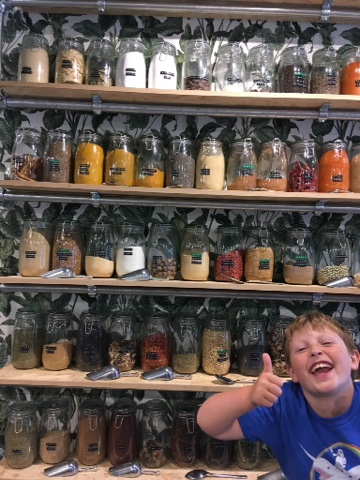Day 9 - a post from mum... It's a bit of a rant!
Every day that we live this adventure without plastic, I'm forced to think about the repercussions of a plastic-free life.
The world I grew up in had very little plastic. (Yes I'm that old). The supermarkets gave you paper bags. Meat got wrapped in wax paper, strawberries came in cardboard punnets and mushrooms were sold in big cardboard baskets with metal handles. My gran used to cut worn sheets in half and swap the halves over and re-stitch them. Everyone (or at least most people) used handkerchiefs. Plastic was reserved for hazelnut yoghurt unless we got loseley (which came in glass jars) and mousses that came frozen with paper lids. Fish and chips were sold in newspaper. Polystyrene was only used in packing expensive electrical goods. Bottled water didn't exist.
Today, bottled water sells in individual portion bottles in packs of 6 wrapped in more plastic.
I went out in the rain today and I was hugely grateful for my waterproof coat- made of plastic, barring my t-shirt, everything I was wearing today was made (or a proportion was) of plastic. Polyester, acrylic, DWR, nylon. My umbrella broke, I can't replace it because they're made of... you guessed it, plastic. My shoes are plastic. Now, we could use leather more, that's what we used to use but that won't work for vegetarians or vegans. We could use natural rubber, but many of us are allergic to latex and other natural rubbers.
I'm allergic to several things, awkward things. I carry an epi-pen - made of plastic, cased in plastic. Alternatives that are safe for my allergies may only be available in plastic. Medical supplies- plasters, steri-strips, syringes, epi-pens... All made from plastic.
Plastic doesn't EVER break down. There are some indications that nature is evolving to help us solve the plastic problem. Recently mycologists have discovered a fungus on a rubbish tip that appears to break plastic down by digesting it and a caterpillar has also been found which appears capable of digesting plastic. Thank you nature.
But:
* this is our problem- humans make, buy and use the stuff without any consideration for the consequences (ok so some of us are beginning to take this seriously)
* it would take a phenomenally large number of caterpillars to chomp through the 275,000 tonnes used in the UK alone each year
* plastics are breaking up rather than breaking down and entering the food chain, OUR food chain. OUR food contains plastics (and not just our teabags) and if it is killing the top predators in the sea, you can bet it isn't doing us any good.
Plastics are an environmental and economic issue.
Avoiding plastic currently and for most things, costs a lot more than just accepting the plastic. Avoiding plastic makes the shopping trip take longer, makes the cooking take longer, makes the housework take longer, adds jobs to the chores list that I didn't know existed. This makes me think this is a feminist issue as well as environmental and economic. Women working has enabled our capitalist economy to make it impossible for families to afford to live on one salary and in turn, women/families need 'labour saving' devices and products so that there's time to do everything we have to do as well as work. From ready meals to the microwaves we cook them in, vacuum cleaners, washing machines, dishwashers, single use cleaning wipes, baby wipes, nappies, instant porridge, instant noodles, instant coffee, single use nespresso pods. 'Disposable' stuff that we need, or are persuaded to buy because we're too busy to make the original thing, that never decomposes.
Back to medical supplies. Plastic is amazing. Single use syringes save lives. I work in the NHS. I deal with infection prevention incidents. Glass syringes had to be scrupulously cleaned and sterilised. Needles likewise. Thank goodness we have the plastic single use version that means the risk of cross-contamination through syringe use in the health service has pretty much been eradicated. If we want to continue to use plastics where we need to (essential / medical supplies) then we need to stop using it elsewhere and re-use / recycle as much and as many times as we can.
I thank the stars that my children are inspired and committed enough to go on this plastic free adventure and write this blog. I know that mine and other children will inspire, motivate and invent and their conviction gives me hope that we'll find our way out of our plastic addiction.

Comments
Post a Comment